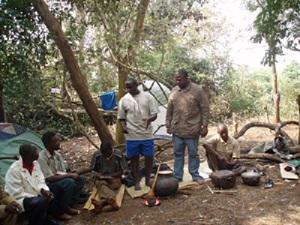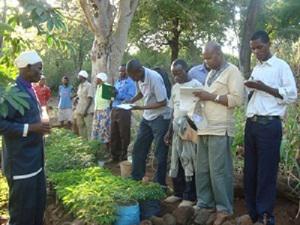Gathuru Mburu
Kenya is basically an agricultural country. We need as much forests as possible to regulate rainfall in order to support agriculture. Unfortunately we have only 1.7% of forests remaining. With changing climate, Kenya has continuously found itself unable to grow enough food to support its ever growing population, which is now well beyond 30 million. Many people, especially the youth, are now destroying forests in order to burn charcoal to earn a living.

Mburu (standing in blue shorts) developing the traditional ecological learning process youth in a forest.
This project will develop an ingenious learning process for elders to educate the youth on the many benefits of indigenous forests apart from charcoal and timber. The elders have lived for many years with those forests without destroying them but still benefiting immensely from the non-timber resources. They will share this knowledge with the young people so that they start income generating projects that conserve forests rather than destroy them. By sharing their knowledge with the youth, the elders will be creating stewards of nature conservation and charging them with the responsibility of protecting the forests for posterity.

An elder discusses roles of indigenous trees in rehabilitation of degraded ecosystems near Kirwaki sacred site in Tharaka.
The project will have four key activities as follows:
1. Mobilization and consensus building with relevant stakeholders
This will entail discussing with Kenya Forestry Service since the project will be implemented in a government forest; discuss with schools around the target forest since their students will be involved in experiential learning in the forests; departments of line ministries of local government, education and agriculture.
2. Inter-generational and community dialogues
This activity is aimed at recuperating local conservation knowledge and enlists participation of local community through dialogues. Community dialogues will lead to establishment of community by-laws which will guide stewardship of the forest as well as identifying elders who will be charged with training the youth during experiential learning. With this, the project will be re-introducing the traditional learning space that was replaced with classes in formal education.
3. Experiential learning
This will be the practical side of the learning model. Elders will take youth into the forest and show them practically the existing non-timber resources and how they are harvested. They will also learn indigenous processes that maintain ecological balance and how these can be respected and sustained for continued accrual of benefits from the forest ecosystem.
4. Process review and reporting
The project will be continuously reviewed and the lessons learnt used to strengthen it. A process report and learning model will be developed at the end of the project.